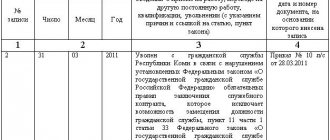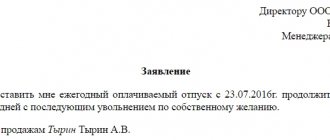General grounds for termination of an employment contract
An employment contract is a bilateral agreement, on the basis of which the parties determine not only the procedure for the emergence of cooperation and the course of its operation, but also its termination. Thus, the law provides for three grounds for termination of an employment contract:
- at the will of the employer within the framework of Article 81 and Article 77 of the Labor Code of the Russian Federation;
- due to circumstances beyond the control of the parties by virtue of Article 83 of the Labor Code of the Russian Federation;
- at the request of the employee on the basis of Article 80 of the Labor Code of the Russian Federation.
At the insistence of the employer, a full-time employee can be fired in quite a few situations: from guilty actions in the form of absenteeism or improper performance of official duties to layoffs. In some cases, employment relationships may be terminated due to changes in working conditions or liquidation of the company due to bankruptcy or merger with another institution.
Under circumstances beyond the control of the employee and his employer, the law means the following grounds:
- conscription into the army;
- sentence to serve a sentence in a colony;
- reinstatement of a former employee by court decision;
- receipt of group 1 disability and inability to perform previous duties;
- death of an employee;
- destruction of the enterprise as such due to a natural disaster.
Termination of cooperation by agreement of the parties is not legally recognized as a separate category.
After all, in fact, the initiator of termination is still one of the parties to the legal relationship, an employee or director. The second party agrees with the proposed conditions and nothing more. If agreement is not reached, the legal relationship may be terminated at the will of one of the parties. A full-time employee also has the right to terminate an employment contract at his own request by notifying the employer in writing of his intention two weeks before the expected release. If the desire to resign comes from a manager, for example, the general director, an application for termination of cooperation is sent to the founders of the company 30 calendar days in advance in accordance with Article 280 of the Labor Code of the Russian Federation.
Reasons for employee dismissal
The simplest type of dismissal from the point of view of its registration is by mutual consent (Article 78 of the Labor Code), when the parties agreed in advance on all the conditions (the main thing is that they do not contradict the law). Other types involve a more complex procedure and the preparation of various documents. Their possible causes are listed in the table below.
This is also important to know:
Should sick leave be paid after dismissal?
| Reasons for dismissal | ||
| At the initiative of the employer | At the employee's initiative | Due to circumstances beyond the control of the parties |
| Staff reduction | Switching to another employer offering more favorable conditions | Calling up an employee for service (urgent, alternative) |
| Liquidation of a company | The employer does not comply with the agreements provided for in the agreement | Conviction of an employee to arrest based on a court decision |
| Change of owner | Family circumstances | Expiration of the agreement |
| Identification of insufficient qualifications of an employee for the position held | Admission to the University | Changes in labor legislation |
| Systematic deviation of an employee from fulfilling the terms of the agreement | Election to elective office | Reinstatement of a specialist who previously worked in the position in connection with a court decision or at the request of the labor inspectorate |
| A one-time, but gross violation of labor discipline by a specialist (appearing drunk, absenteeism, etc.) | Retirement | Failure to be elected to office |
| Detection of the fact that an employee used forged documents when applying for a job | Starting a business | Loss of ability to work according to a medical report |
| Loss of trust in an employee (committing unacceptable actions when working with material assets) | Refusal to continue working in the event of a change of owner or change of jurisdiction | Death of an employer (IP) or employee, as well as recognition of one of them as missing |
| Commitment of an immoral act by a person who is called upon to perform edifying functions (for example, a teacher in an educational institution or a teacher in a kindergarten) | Refusal to continue working if the terms of the employment agreement change | The occurrence of force majeure circumstances officially recognized by the authorities |
| An incorrect decision made by a specialist holding a responsible position (manager, accountant, etc.), which led to significant material damage | Refusal to transfer to another position due to a medical report received | Temporary (for at least 2 months) or permanent loss by a specialist of any rights necessary to perform functional duties (license, driving license, etc.) |
| Failure by the employee to comply with labor protection regulations, which led or could lead to serious consequences | Refusal to transfer due to a change in the company's place of business | Exceeding the permissible number of foreign employees (if the employee is a citizen of another state) |
| Significant damage by an employee to the organization’s property, recorded in court | Introduction of restrictions on the access of a civil servant to information that is a state secret when it is necessary for the performance of official duties | |
| Dissemination of confidential information by an employee | Bringing an employee to administrative punishment or disqualification, which does not make it possible to continue working in the organization under the terms of the contract | |
Termination of an employment contract at the initiative of the employee
Article 80 of the Labor Code of the Russian Federation defines the general procedure for terminating employment relations at the will of the employee, but under each application there are certain circumstances that force the employee to take such drastic measures. At the same time , the law does not oblige the worker to disclose the reason for his desire to terminate cooperation and, moreover, to confirm it with documents, with the exception of certain cases.
Thus, Article 80 of the Labor Code of the Russian Federation states that, in general, an employee can be dismissed after so-called service, that is, after 14 days from the date of filing the application. However, in a number of situations, the company’s management is obliged to immediately satisfy his request and terminate the employment contract literally within a few days. This is how you can quit as soon as possible:
- upon retirement;
- admission to study at a university with full-time education;
- other cases, for example, the transfer of a serviceman’s husband to another region or the need to care for a close relative in another city.
Important! The Labor Code of the Russian Federation does not contain such a term as working off. It refers to a period of time equal to 14 calendar days, which is provided for an employee to notify management of his intention to resign.
They don't sign the application. What to do
It’s a fairly common practice when a person wants to change a company for one reason or another, but they start putting spokes in his wheels: “there’s no director in place,” “let’s do it, I’ll sign it later,” etc. And after a while they refuse with the wording “there is no one to work”, “I do not consent to your dismissal”. Some are so dishonest that you can hear the answer “I didn’t see your application” and so on.
To avoid these or other problems, it is enough to follow one of two scenarios:
- Write a written application and register it with the secretary or other authorized person.
- Send a registered letter.
This is also important to know:
Dismissal of a pregnant woman under a fixed-term employment contract: important nuances
The first option will be faster, because... the two-week period will begin the day after registration. The employer will not be able to later claim that he “did not see and did not know.” The duty of the secretary or other authorized person to notify the authorities as soon as possible.
With the option of sending through the Russian Post service, everything will take a little longer. The two-week period will begin on the day the employer receives the letter, not on the date it is sent. When the application has reached the addressee, it will be indicated in the notification, which means the employee will know the exact date of receipt.
Free legal consultation
We will answer your question in 5 minutes!
Free legal consultation We will answer your question in 5 minutes!
Call: 8 800 511-39-66
Ask a Question
After this, the director will have to release the employee. Clause 3 art. 77 of the Labor Code of the Russian Federation obliges us to do this.
Additional grounds for termination of the contract
It is believed that Article 80 of the Labor Code of the Russian Federation contains an exhaustive list of grounds for termination of an employment contract at the initiative of an employee, but labor legislation provides for several more cases that are actually the will of the employee to terminate the legal relationship. In particular, the legal grounds for termination of an employment contract are:
- Dismissal during probationary period. Under Article 71 of the Labor Code of the Russian Federation, not only the employer can terminate cooperation within the probationary period due to unsatisfactory results, but also the employee if he has come to the conclusion that the working conditions do not suit him.
- Termination of legal relations after receiving notice of layoff. By virtue of Article 180 of the Labor Code of the Russian Federation, an employee, after notification of the reduction of his position after 2 months, has the right to submit an application for early dismissal due to reduction.
- Transfer to another institution. In accordance with the norms of Part 5 of Article 77 of the Labor Code of the Russian Federation, an employee may, on his own initiative, ask for a transfer to another employer. After written agreement on future terms of cooperation and the consent of the current director, the employee is relieved of his position.
Important! The legal grounds for termination of an employment contract, provided for in Parts 6–9 of Article 77 of the Labor Code of the Russian Federation, cannot be regarded as dismissal of an employee at his own request due to the fact that the employee is forced to terminate legal relations due to the same changes in working conditions or the state of his health.
Possible nuances
The process of terminating an employment relationship under the Labor Code may have certain nuances based on one or another reason for the termination of the agreement.
Thus, when dismissing an employee under the Labor Code of the Russian Federation due to his violation of discipline, the employer must request an explanation from him. In case of leaving of one's own free will, a pre-submitted application on the part of the employee is mandatory. If management intends to terminate employment relations with some of the people working in the organization due to staff reduction, then it is obliged to notify the relevant people about this at least 2 months in advance.
According to the law, it is prohibited to fire employees when they are on sick leave or on vacation. It is also not allowed to terminate an employment agreement with a pregnant woman (except in the case of liquidation of the enterprise).
If the reason for the interruption of the employment relationship was the liquidation of the company or the reduction of its staff, then the dismissed person has the right to count on severance pay, which is guaranteed by Art. 178 TK. The benefit amount is equal to the average monthly earnings. A collective or labor agreement may provide for other amounts of payments that exceed the minimum established by law. The benefit is issued on the day of dismissal, the date of which is indicated in the application (it remains the same even if the employee is on sick leave).
This is also important to know:
What is the retention period for the personal files of dismissed employees?
There are two types of severance pay:
- paid upon liquidation of an organization (the amount of payments is established by Article 81 of the Labor Code);
- provided upon dismissal due to inadequacy of the position. In the latter case, it is paid upon termination of the employment agreement due to the employee’s refusal to move to another position offered by the employer or due to a medical report received that does not allow him to carry out his previous work, if there is no other workplace in the organization.
The peculiarities of dismissal during the probationary period deserve special mention. The Labor Code (Article 71) allows the employer to terminate the employment agreement on his own initiative before the end of the period established by the contract if, in the opinion of management, the employee shows unsatisfactory results. In this case, the employer is obliged to notify the employee in writing (no later than 3 days) according to the Labor Code of the Russian Federation, which must indicate the reasons why the latter did not pass the test. This decision can be challenged by the employee in court.
If the trial period is not completed, the contract is terminated without involving the opinion of the relevant trade union. In such a situation, the dismissed person cannot count on severance pay.
If, after the expiration of the probationary period, the employee continues to perform his functions, then he is considered to have completed the trial period, and therefore termination of the employment agreement becomes possible only in compliance with the general grounds.
An employee undergoing a trial period can terminate the contract on his own initiative if during the trial he considers that the job is not suitable. In this case, he warns the employer in writing 3 days in advance.
If an employee believes that he was removed from his position unlawfully, under the Labor Code of the Russian Federation he can challenge the employer’s decision. To do this, you should file a complaint with one of the following structures:
- to the labor inspectorate, which, according to the rules, must consider the application within a month from the date of its submission;
- to the court, which is also required by law to consider the appeal within 30 days, but in fact it turns out to be longer;
- to the prosecutor's office.
Examples of termination of an employment contract
As a rule, the grounds for termination of an employment contract are related to family circumstances or the professional expectations of employees. In particular, often an employee is not confident in career growth and the opportunity to realize himself in a certain company. Therefore, he is looking for another employer who can provide him with better opportunities.
Also, dismissal may follow due to the fact that it is difficult to combine child care with intense work activity, especially if the children are small. After all, a woman not only has to prepare reports and analyze the economic benefits of her partners, but also prepare dinner, do laundry and clean.
The need to change employer may be caused by conflict situations with employees or immediate superiors. Not all managers are tactful; moreover, some prefer to build working relationships based on personal sympathy, without taking into account the merits of a particular employee.
Termination procedure
The procedure for terminating an employment relationship at the initiative of an employee is quite simple.
In pursuance of Article 80 of the Labor Code of the Russian Federation, the employee draws up a handwritten application requesting dismissal. If the date of termination of the employment contract is not specified, it is assumed that the dismissal order must be issued 14 days from the date of filing the application. If the employee stipulates a specific date in the document, the employer can approve it through a resolution only under certain circumstances. That is, if we are talking about retirement, the boss cannot refuse dismissal on the day specified by the employee, but if the grounds for termination of the employment contract are not provided for in the Labor Code of the Russian Federation, the issue of dismissal is resolved in a short time by agreement of the parties.
Based on the application, a dismissal order is issued. On the day of release, which is considered the last working day, the employee, in accordance with the norms of Article 84.1 of the Labor Code of the Russian Federation, is given a work book with an entry corresponding to the grounds reflected in the administrative act and calculated payments in accordance with Article 140 of the Labor Code of the Russian Federation. At the request of the dismissed employee, in accordance with the norms of Article 62 of the Labor Code of the Russian Federation, the employer is obliged to issue copies of documents related to the work activities of the former employee.
Types of dismissal
If we classify all the reasons for dismissals under the Labor Code of the Russian Federation according to the criterion of why they occur, we can distinguish four main types:
- at the initiative of the employee;
- at the initiative of the employer;
- by mutual agreement;
- for reasons beyond the control of the parties (for example, upon expiration of the contract).
Dismissal at the employee's own request
Having decided to leave, the employee is obliged to notify his employer about this in advance - two weeks.
Many people assume that the employee must work this time, but from the point of view of the law, this statement is not true. The employee simply states his intention to leave the employer on a certain date.
A written or printed statement, registered according to the rules of incoming documentation, will confirm that the employer has been notified in the event of a dispute.
Therefore, it is necessary to write such a statement in two copies: one for the manager, the second for a mark of acceptance.
Methods for submitting an application:
- personally to the employer (the manager himself puts an acceptance mark on the second copy);
- through the office or secretary (the application is registered as incoming documentation, the secretary affixes a stamp of acceptance);
- send by letter with notification (when indicating the date of dismissal, it is necessary to take into account the time for delivery of the letter). This sending option is acceptable, for example, when the manager refuses to receive the application in person, but there is no secretary on staff, the employee is on vacation or on sick leave.
When writing an application, it is important not to get confused with dates. The text itself specifies the date from which dismissal is expected. 2 weeks are counted from it, this is how the date of writing the application is obtained. There must be at least two weeks between the date of signing the application and the date of the intended dismissal.
If the manager agrees and does not need time to find a new employee, then he has the right not to wait the stated weeks and sign the employee’s application immediately.
The Labor Code of the Russian Federation establishes the employer’s obligation to dismiss an employee within the period specified by him, even if the two-week requirement is not met. This applies to situations where it is impossible to continue the working relationship in principle. For example, entering a university, retiring. An employee may change his mind during these two weeks. This is unacceptable if a candidate has already been invited in writing and whose employment cannot be refused (for example, due to a transfer).
After approval of the application, the employer prepares an order. It is advisable to draw it up closer to the end of the two-week period, so as not to violate the employee’s right to refuse his own intention.
If such a statement is not signed before the expiration of the two-week period, then the following scenarios are possible:
- continue to work if the employee changes his mind about quitting;
- actually stop working from the planned date.
The choice of any course of action rests with the employee. The actual continuation of the working relationship entails the cancellation of the application.
Dismissal at the initiative of the employer
Significant difficulties are caused by dismissal initiated by the employer. This is due to a significant number of reasons for terminating a relationship:
- liquidation of an organization or closure of an individual entrepreneur;
- reduction in the number of employees or positions in the state;
- unsatisfactory result of employee certification;
- for the manager, deputies, chief accountants - change of owner of the organization;
- committing an offense two or more times;
- gross violation of work duties the first time;
- absenteeism;
- showing up at work in a state of any kind of intoxication;
- disclosure of legally protected secrets;
- for other reasons specified in Art. 81 Labor Code of the Russian Federation.
This is also important to know:
Dismissal of the CEO: options
Reasons for dismissal may also be specified in special laws (for example, the Merchant Shipping Code provides that if a mandatory medical examination is not completed, the employment contract may be terminated).
There are rules that must be followed upon dismissal by decision of the employer:
- the manager must make sure that the reasons for termination exist and formalize them properly (for example, in case of misconduct, in case of layoff);
- notify the candidate for dismissal about this (for example, by sending a corresponding notice during liquidation, requesting an explanation for absenteeism);
- if required, wait for a response from the employee;
- based on the results of consideration of the response, issue an order to terminate the relationship;
- familiarize the employee with the order in writing and provide him with a copy of the order (if the employee refuses to familiarize himself with the order and receive a copy, this is recorded).
A special feature of dismissal on this basis is the participation of the trade union in the procedure. The Labor Code of the Russian Federation speaks of its mandatory participation in the liquidation or closure of individual entrepreneurs, layoffs, and certification (Article 82 of the Labor Code of the Russian Federation). But the collective agreement of the enterprise may allow the participation of the trade union when considering the issue of dismissal for other reasons.
Dismissal due to expiration of the employment contract
The Labor Code of the Russian Federation gives the right to formalize working relationships for a specific period.
If the manager does not intend to extend them, then he reminds the employee that this deadline is approaching. This is carried out three days before the expiration of the contract. You do not have to warn the employee if it concerns a dismissed person who replaced another employee (for example, one on maternity leave).
In this case, at the request of Part 1 of Art. 79 of the Labor Code of the Russian Federation, the relationship is terminated from the day the former employee leaves. The agreement can be signed without specifying a specific date.
The instruction is given at a certain moment. For example, for the duration of a specific job or for a certain season. Termination occurs when the work is completed and its results are transferred (Part 2 of Article 79 of the Labor Code of the Russian Federation). That is, the moment of termination is not related to the exact date.
Free legal consultation
We will answer your question in 5 minutes!
Free legal consultation We will answer your question in 5 minutes!
Ask a Question
Ask a Question
If the worker was hired for a specific season, then with the end of this season the contract is also terminated (Part 3 of Article 79 of the Labor Code of the Russian Federation). The season in each industry is set separately and is not always related to the time of year (for example, heating time in the energy sector, the end of which cannot be immediately dated). A contract for a specific period can be terminated before the end of its validity period:
- at the request of the employee;
- at the request of the employer;
- according to a new agreement.
If the end of the term falls during the employee’s pregnancy, then, with a doctor’s certificate, this period is extended until the birth.
Dismissal by agreement
The working relationship can be terminated by agreement between the employee and his manager. This is provided for in Art. 78 Labor Code of the Russian Federation.
An agreement is drawn up for this purpose. Either party sends the opponent a proposal to terminate the relationship.
If the opponent agrees, then the participants begin discussing the terms of the dismissal procedure. The peculiarity of such an event is that there are no deadlines for proposals or agreement on conditions.
The agreement may contain additional guarantees, compensation, compensation for the employee. This is the most democratic basis, regarding which, subject to the conditions of good will of both parties, practically no conflicts arise.
After reaching an agreement on all terms and conditions, a dismissal order is prepared. The relationship ends on the last working day. It is then that the dismissed person is given his work book indicating the reason for leaving work, and a settlement is also made with the employee.
It includes:
- salary for the last working month or part thereof;
- payment for vacation that was not used in the last working year;
- severance pay (mandatory by law or by agreement);
- other amounts under the employment contract, collective agreement or local act of the organization.
Knowledge of the dismissal procedure is important for everyone involved in the working relationship. They allow you not to be afraid of the difficulties of the upcoming event, and sometimes they can push the party to initiate it.









